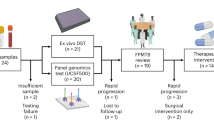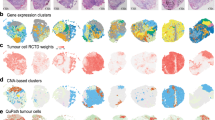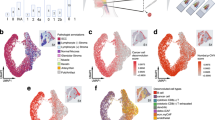Abstract
Renal cell carcinoma (RCC) is a major health issue. Whereas localized disease can be cured surgically, there is no effective therapy for metastatic disease. The development of an effective therapy will require an understanding of the pathways that are important in RCC carcinogenesis and progression. Using genomic profiling of patient-matched tissue, we have identified aberrations in the transforming growth factor β (TGFβ) signaling pathway in RCC. We observed loss of type III TGFβ receptor (TBR3) expression in all RCC samples. This suggests that TBR3 loss is an early event in RCC carcinogenesis and plays a sentinel role in the acquisition of a tumorigenic phenotype. We also observed subsequent loss of type II TGFβ receptor (TBR2) expression in metastatic RCCs. We propose that loss of TBR3 is necessary for RCC carcinogenesis, and that loss of TBR2 leads to acquisition of a metastatic phenotype. To this end, we have identified a human renal cell carcinoma line (UMRC6) that is representative of localized, nonmetastatic RCC, reflecting a loss of TBR3, but not TBR2 expression. Another cell line, UMRC3, is highly metastatic, having lost TBR3 and TBR2 expression. We demonstrate functional loss of TGFβ responsiveness in these cell lines as observed through phenotypic and transcriptional responsiveness to exogenous TGFβ. Restoring TBR2 and TBR3 expression in UMRC3 cells attenuates cell proliferation, completely restores TGFβ-mediated transcriptional responses, and completely blocks anchorage independent-growth: while restoration of TBR2 partially restores TGFβ-mediated signaling. Based on these data, we propose that dysregulation in TGFβ signaling, through stepwise loss in receptor expression, plays a prominent role in RCC carcinogenesis and progression. In addition, these studies unequivocably demonstrate a link between loss of TBR3 and a human disease.
This is a preview of subscription content, access via your institution
Access options
Subscribe to this journal
Receive 50 print issues and online access
$259.00 per year
only $5.18 per issue
Buy this article
- Purchase on Springer Link
- Instant access to full article PDF
Prices may be subject to local taxes which are calculated during checkout






Similar content being viewed by others
Abbreviations
- RCC:
-
renal cell carcinoma
- TGFβ:
-
transforming growth factor β
- TBR3:
-
type III TGFβ receptor
- TBR2:
-
type II TGFβ receptor
- TBR1:
-
type I TGFβ receptor
References
Abreu JG, Ketpure NI, Reversade B and De Robertis EM . (2002). Nat. Cell Biol., 4, 599–604.
Akhurst RJ and Derynck R . (2001). Trends Cell Biol., 11, S44–S51.
Allander SV, Nupponen NN, Ringner M, Hostetter G, Maher GW, Goldberger N, Chen Y, Carpten J, Elkahloun AG and Meltzer PS . (2001). Cancer Res., 61, 8624–8628.
Blobe GC, Scheimann WP, Pepin M-C, Beauchemin M, Moustakas A, Lodish HF and O'Connor-McCourt MD . (2001). J. Biol. Chem., 276, 24627–24637.
Bottinger EP and Bitzer M . (2002). J. Am. Soc. Nephrol., 13, 2600–2610.
Boyd FT and Massague J . (1989). J. Biol. Chem., 264, 2272–2278.
Boyer AS and Runyan RB . (2001). Dev. Dynam., 221, 454–459.
Cardillo MR, Lazzereschi D, Gandini O, Di Silverio F and Colletta G . (2001). Anal. Quant. Cytol. Histol., 23, 109–117.
Chen C, Wang X-F and Sun L . (1997). J. Biol. Chem., 272, 12862–12868.
Copland JA, Davies PJ, Shipley GL, Wood CG, Luxon BA and Urban RJ . (2003). Recent Prog. Horm. Res., 58, 25–53.
Dedir A, Ozener C, Adm B and Emerk K . (1996). Clin. Biochem., 29, 385–388.
Deng X, Bellis S, Yan Z and Friedman E . (1999). Cell Growth Differ., 10, 11–18.
DeRisi J, Penland L, Brown PO, Bittner ML, Meltzer PS, Ray M, Chen Y and Su YA . (1996). Nat. Genet., 14, 457–460.
Derynck R, Zhang Y and Feng X-H . (1998). Cell, 95, 737–740.
Engel JD, Kundu SD, Yang T, Lang S, Goodwin S, Janulis L, Cho JS, Chang J, Kim SJ and Lee C . (1999). Urology, 54, 164–170.
Esparza-Lopez J, Montiel JL, Vilchis-Landeros MM, Okadomes T, Miyazono K and Lopez-Casillas F . (2001). J. Biol. Chem., 276, 14588–14596.
Gilbert RE, Cox A, Wu LL, Allen TJ, Hulthen UL, Jerums G and Cooper ME . (1998). Diabetes, 47, 414–422.
Gold LI . (1999). Crit. Rev. Oncogenesis, 10, 303–360.
Grossman HB, Wedemeyer G and Ren L . (1985). J. Surg. Oncol., 28, 237–244.
Hegele A, Varga Z, von Knobloch R, Heidenreich A, Kropf J and Hofmann R . (2003). Urol. Res., 30, 126–129.
Jemal A, Murray TSA, Ghafoor A, Ward E and Thun MJ . (2003). CA Cancer J. Clin., 53, 5–26.
Kim SJ, Im YH, Markowitz SD and Bang YJ . (2000). Cytokine Growth Factor Rev., 11, 159–168.
Kinzler KW and Vogelstein B . (1996). Cell, 87, 159–170.
Kundu S D, Kim IY, Zelner D, Janulis L, Goodwin S, Engel JD and Lee C . (1998). J. Urol., 160, 1883–1888.
Laiho M, Weis MB and Massague J . (1990). J. Biol. Chem., 265, 18518–18524.
Lopez-Casilas F, Cheifetz S, Doody J, Andres JL, Lane WS and Massague J . (1991). Cell, 67, 785–795.
Markowitz S, Wang J, Myeroff L, Parsons R, Sun L, Lutterbaugh J, Fan RS, Zborowska E, Kinzler KW and Vogelstein B, et al. (1995). Science, 268, 1336–1338.
Massague J and Wotton D . (2000). EMBO J., 19, 1745–1754.
Maustakas A, Souchelnytksyi S and Heldin CH . (2001). J. Cell. Sci., 114, 4359–4369.
Ramp U, Jaquet K, Reinecke P, Nitsch T, Gabbert HE and Gerharz CD . (1997a). Lab. Invest., 76, 739–749.
Ramp U, Jaquet K, Reinecke P, Schardt C, Friebe U, Nitsch T, Marx N, Gabbert HE and Gerharz CD . (1997b). J. Urol., 157, 2345–2350.
Sakharova OV, Taal MW and Brenner BM . (2001). Curr. Opin. Nephrol. Hypertens., 10, 727–738.
Schena M, Shalon D, Davis RW and Brown PO . (1995). Science, 270, 467–470.
Schiemann WP, Blobe GC, Kalume DE, Pandey A and Lodish HF . (2002). J. Biol. Chem., 277, 27367–27377.
Sens DA, Detrisac CJ, Sens MA, Rossi MR, Wenger SL and Todd JH . (1999). Exp. Nephrol., 7, 344–352.
Sun L and Chen C . (1997). J. Biol. Chem., 272, 22367–25372.
Takahashi M, Rhodes DR, Furge KA, Kanayama H, Kagawa S, Haab BB and The BT . (2001). Proc. Natl. Acad. Sci. USA, 98, 9754–9759.
ten Dijke P, Miyazono K and Heldin CH . (2000). Trends Biochem. Sci., 25, 64–70.
Terzi F, Burtin M, Hekmati M, Federici P, Grimber F, Briand P and Friedlander B . (2000). J. Clin. Invest., 106, 225–234.
Trifillis AL . (1999). Exp. Nephrol., 7, 353–359.
Wogensen L, Nielsen CB, Hjorth P, Rasmussen LM, Nielsen AH, Gross K, Sarvetnick N and Ledet T . (1999). Diabetes, 48, 182–192.
Wunderlich H, Steiner T, Kosmehl H, Junker U, Reinhold D, Reichelt O, Zermann DH and Schubert J . (1998). Urol. Int., 60, 205–207.
Zhang Y and Derynck R . (1999). Trends Cell Biol., 9, 274–279.
Acknowledgements
Editorial comments from Drs Aubrey Thompson and Alan Fields were invaluable in the preparation of this manuscript. This work was supported in part by the John Sealy Memorial Endowment Fund for Biomedical Research Grant#2529-01 (JAC), the American Cancer Society Grant#1003-00 (JAC), and UTMB Tobacco Funds (BAL), HRH Prince Abdulaziz bin Abdullah and his children, HRH Prince Abdullah bin Abdulaziz bin Abdullah, Prince Khalid Abdulaziz bin Abdullah and Princess Sadeen bin Abdulaziz Renal Cancer Research Fund (CGW) and Eleanor and Joseph Zuber Research Fund (CGW).
Author information
Authors and Affiliations
Corresponding author
Rights and permissions
About this article
Cite this article
Copland, J., Luxon, B., Ajani, L. et al. Genomic profiling identifies alterations in TGFβ signaling through loss of TGFβ receptor expression in human renal cell carcinogenesis and progression. Oncogene 22, 8053–8062 (2003). https://doi.org/10.1038/sj.onc.1206835
Received:
Revised:
Accepted:
Published:
Issue Date:
DOI: https://doi.org/10.1038/sj.onc.1206835
Keywords
This article is cited by
-
Decreased TGFBR3/betaglycan expression enhances the metastatic abilities of renal cell carcinoma cells through TGF-β-dependent and -independent mechanisms
Oncogene (2018)
-
Axl is required for TGF-β2-induced dormancy of prostate cancer cells in the bone marrow
Scientific Reports (2016)
-
Transforming growth factor beta receptor type III is a tumor promoter in mesenchymal-stem like triple negative breast cancer
Breast Cancer Research (2014)
-
TGF-β – an excellent servant but a bad master
Journal of Translational Medicine (2012)
-
Convergent animal and human evidence suggests the activin/inhibin pathway to be involved in antidepressant response
Translational Psychiatry (2012)



